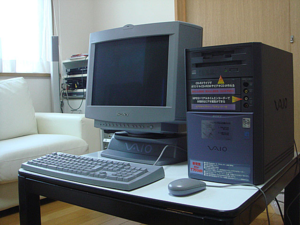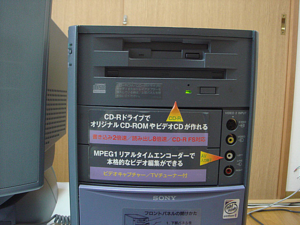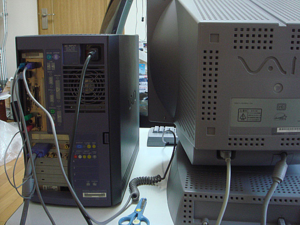PCV-T: Difference between revisions
Romanio0089 (talk | contribs) mNo edit summary Tag: Manual revert |
|||
| (6 intermediate revisions by 2 users not shown) | |||
| Line 3: | Line 3: | ||
== Overview == | == Overview == | ||
The Sony VAIO PCV- | The Sony VAIO PCV-T was a desktop PC component system released by Sony in 1997. It was the Japanese version of the PCV-70, which was first released in the USA. It was released one year after the PCV-70, but was upgraded in almost every way, from CPU to GPU to storage. | ||
It featured multimedia capabilities (for the time) with a focus on audio and video playback and recording, vie the CD-Drive. As DVD hadn't been commercialised yet, consumers used it to write video to Video-CDs (VCDs) which they would then play back on the big screen. | |||
[[File:PCV-T with front panel removed.png|alt=PCV-T with front panel removed|thumb|PCV-T with front panel removed]] | [[File:PCV-T with front panel removed.png|alt=PCV-T with front panel removed|thumb|PCV-T with front panel removed]] | ||
It is the evolution of the PCV-70/90 series and features the same metal build with a signature dark-purple VAIO colour front panel that slides down to reveal the CD-R and Floppy drive, S-Video and composite inputs. The PC was special at the time because it included a real-time MEPG-1 encoder (costing an extra 10,000 yen, which was made standard shortly after release), one of if not the first PC to do this. With this new MPEG encoding, it was able to record video from the front composite and S-Video ports and edit it onto a Video-CD (VCD) using the bundled VAIO Slipclip software. | It is the evolution of the PCV-70/90 series and features the same metal build with a signature dark-purple VAIO colour front panel that slides down to reveal the CD-R and Floppy drive, S-Video and composite inputs. The PC was special at the time because it included a real-time MEPG-1 encoder (costing an extra 10,000 yen, which was made standard shortly after release), one of if not the first PC to do this. With this new MPEG encoding, it was able to record video from the front composite and S-Video ports and edit it onto a Video-CD (VCD) using the bundled VAIO Slipclip software. | ||
| Line 12: | Line 14: | ||
== Detailed Specs == | == Detailed Specs == | ||
'''Processor:''' Intel Pentium II | '''Processor:''' Intel Pentium II 233, 266, 300, 400MHz | ||
'''Graphics:''' ATI 3D RAGE II/PRO ( | '''Graphics:''' ATI 3D RAGE II/PRO (4MB VRAM) (AGP) | ||
'''Memory:''' | '''Memory:''' 128MB SDRAM (officially expandable to 192MB), 4 slots | ||
'''Storage:''' 4. | '''Storage:''' 4.3GB to 13GB IDE HDD | ||
''' | '''Optical drive:''' 8x CD-R ATAPI drive | ||
'''Display:''' 17" Trinitron (70KHz) with speakers, woofers and a microphone | '''Display:''' 17" Trinitron (70KHz) with speakers, woofers and a microphone | ||
| Line 31: | Line 33: | ||
'''Operating System:''' Windows 95/98 | '''Operating System:''' Windows 95/98 | ||
'''Weight:''' 13.5kg | |||
== Daily Usage Today == | == Daily Usage Today == | ||
| Line 38: | Line 42: | ||
== Resources == | == Resources == | ||
If a link is broken, please input the URL in the [http://web.archive.org Wayback Machine]. | |||
====Recovery Discs==== | |||
No recovery disks have been found. | No recovery disks have been found. | ||
====Manuals and Useful Links==== | |||
No manuals have been found. | |||
{| class="wikitable" | |||
|+Presentation Pages | |||
|- | |||
|PCV-T710MR/T510R||[https://www.sony.jp/products/Consumer/PCOM/TOWER/index.html Sony JP] | |||
|- | |||
|PCV-T720MR/T510R||[https://www.sony.jp/products/Consumer/PCOM/VAIO/TOWER720/index.html Sony JP] | |||
|} | |||
====Guides==== | |||
{| class="wikitable" | |||
|- | |||
|Disassembly and general info||[http://www.vaiosite.com/review/vaio/old/t720mr/t720.htm vaiosite.com] | |||
|} | |||
Disassembly is similar to any standard desktop PC, but care should be taken with the aged ABS plastic casing. | Disassembly is similar to any standard desktop PC, but care should be taken with the aged ABS plastic casing. | ||
Latest revision as of 16:55, 22 December 2024
Overview
The Sony VAIO PCV-T was a desktop PC component system released by Sony in 1997. It was the Japanese version of the PCV-70, which was first released in the USA. It was released one year after the PCV-70, but was upgraded in almost every way, from CPU to GPU to storage.
It featured multimedia capabilities (for the time) with a focus on audio and video playback and recording, vie the CD-Drive. As DVD hadn't been commercialised yet, consumers used it to write video to Video-CDs (VCDs) which they would then play back on the big screen.
It is the evolution of the PCV-70/90 series and features the same metal build with a signature dark-purple VAIO colour front panel that slides down to reveal the CD-R and Floppy drive, S-Video and composite inputs. The PC was special at the time because it included a real-time MEPG-1 encoder (costing an extra 10,000 yen, which was made standard shortly after release), one of if not the first PC to do this. With this new MPEG encoding, it was able to record video from the front composite and S-Video ports and edit it onto a Video-CD (VCD) using the bundled VAIO Slipclip software.
The rear of the PCV-T has many outputs, including VGA, Composite, S-Video, 3.5mm Audio out and many inputs, including Serial, Audio, Printer cable, TV in, USN and PS/2.
Detailed Specs
Processor: Intel Pentium II 233, 266, 300, 400MHz
Graphics: ATI 3D RAGE II/PRO (4MB VRAM) (AGP)
Memory: 128MB SDRAM (officially expandable to 192MB), 4 slots
Storage: 4.3GB to 13GB IDE HDD
Optical drive: 8x CD-R ATAPI drive
Display: 17" Trinitron (70KHz) with speakers, woofers and a microphone
Expansion Slots: Three PCI, one PCI/ISA, two ISA
TV Tuner: Channels 1-62, stereo audio
Video Capture: S-Video/composite input, MPEG-1 real-time encoder
Operating System: Windows 95/98
Weight: 13.5kg
Daily Usage Today
The PCV-T series is now unusable for any modern tasks except for the things that it could do back in the day, such as some basic old gaming, word processing and spreadsheets. Obviously this is now a collectors item that no one is going to use for any modern tasks, though if used it should most definitely be upgraded with a SSD and more RAM, which can be hard to find.
Keep in mind that these models are rare and very hard to find.
Resources
If a link is broken, please input the URL in the Wayback Machine.
Recovery Discs
No recovery disks have been found.
Manuals and Useful Links
No manuals have been found.
| PCV-T710MR/T510R | Sony JP |
| PCV-T720MR/T510R | Sony JP |
Guides
| Disassembly and general info | vaiosite.com |
Disassembly is similar to any standard desktop PC, but care should be taken with the aged ABS plastic casing.
Sources
PCV-T720MR Specs PCV-T710MR Specs PCV-T700MR Specs PCV-T510R Specs Anniversary-Net PCV-T700MR Review


